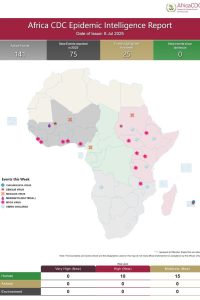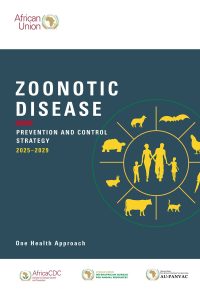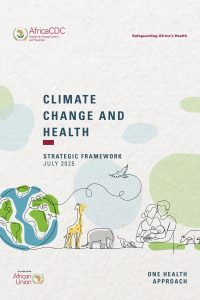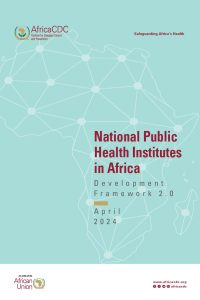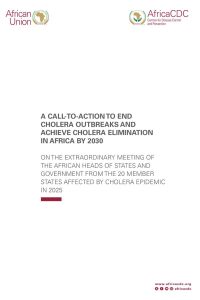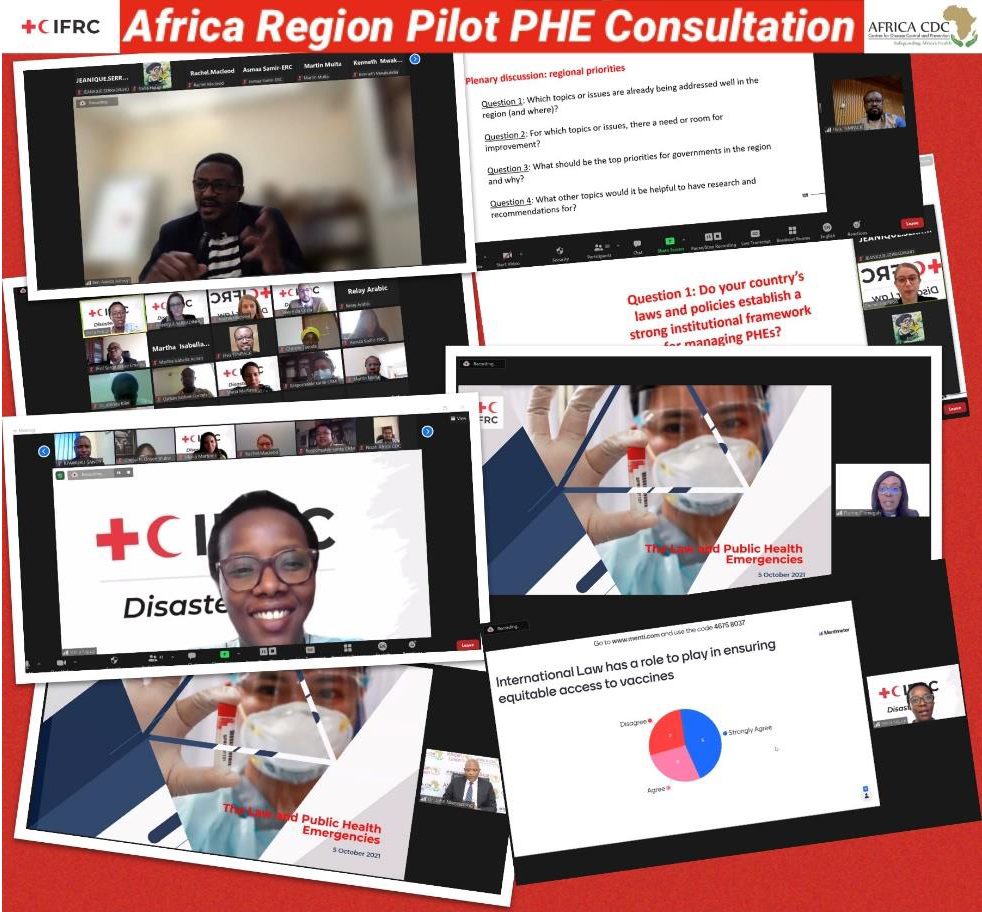
- Version
- Download 4836
- File Size 248.38 KB
- File Count 1
- Create Date 20 October 2021
- Last Updated 25 October 2021
Experts discuss law and public health emergency preparedness and response in Africa
Humanitarian, public health and legal experts from across Africa came together for a consultation on the Pilot Guidance for Law and Public Health Emergency (PHE) Preparedness and Response (the Guidance).
The consultation was held on 5-6 October 2021 by IFRC Disaster Law and the Africa Centre for Disease Control and Prevention for governments, national societies, civil society and international organisations. This is the first public collaborative engagement between IFRC and Africa CDC in the region following the signing of an MoU on collaboration to strengthen public health systems at the community level, and support preparation for better response to PHEs.
The Guidance is based on the recommendations from IFRC Disaster Law’s recently launched and ground-breaking report, Law and PHE Preparedness and Response: Lessons from the COVID-19 Pandemic.
The principal aims of the Guidance are to identify key elements that underpin and support effective PHE risk management, serve as an assessment tool for those undertaking reviews of domestic laws, policies and plans relating to PHEs and provide guidance on how to implement relevant international obligations and standards including the International Health Regulations, the Sendai Framework, and the Bangkok Principles.
The Guidance is not intended to be prescriptive. It is instead intended to provide high-level guidance that can, and should, be adapted to each country’s specific constitutional, legal, political, institutional, and operational arrangements.
The purpose of the consultation with key stakeholders in Africa was to gather critical feedback on Guidance to ensure that it is fit for its purpose in the region.
Stella Ngugi, IFRC Disaster Law Africa Coordinator a.i., says that the consultation was a great success and invaluable for the rollout of the Guidance in Africa at a time where communities are still impacted by the COVID-19 pandemic and other PHEs.
“Ensuring effective legal arrangements that address reduction, preprepared response and recovery, are in place for public health emergencies is a priority for all countries. We have seen the devastating impact of the COVID-19 pandemic across Africa, and we must use the law to help strengthen all phases of the response to keep communities safe and save lives.”
Feedback from the consultation included:
Participation: A wide range of governmental as well as non-governmental actors play a role in PHE management and therefore it is key that a multi-sectoral, all of society approach is taken to PHE management. Laws and policies need to identify the roles and responsibilities of all actors and provide for clear coordination mechanisms between actors. Simulation exercises may be useful to ensure that all relevant actors are aware of their roles and responsibilities in PHEs.
Early warning, early action: Participants highlighted the importance of developing multi-sectoral early warning systems to ensure that each sector can detect any threat to public health, which also allows for collaboration and the sharing of information across sectors. Early warning information should also be clear and actionable by all relevant actors, including communities.
Preparedness and response: Participants highlighted the importance of making sure that early warning findings inform preparedness activities, and that a holistic multi-sectoral approach is taken with regards to PHE response, ensuring that no one is left behind.
Reviewing laws and policies: Several countries’ laws for managing PHEs are outdated, and participants recognised the importance of regularly reviewing laws and policies for PHE management to ensure that they remain relevant.
Monitoring and implementation of the International Health Regulations (IHRs) can be improved in the region. One of the recommendations made was that states should take the necessary steps to ensure the domestication of the IHRs into their national legal systems. Education on the IHRs and public health law should be undertaken to increase awareness of the obligations of these regulations, as well as increasing human resources to better support their implementation in the region.
Enhancing regional cooperation: A priority highlighted in the consultation was ensuring that regional collaboration, coordination, communication and cooperation frameworks and platforms are utilised to allow different stakeholders from member states within the region to effectively cooperate, coordinate, share information and exchange lessons learned to support the prevention and management of PHEs in the region.
Humanitarian access: Participants acknowledged the need to ensure a humanitarian pathway to allow the movement of such actors, whilst maintaining a balance between granting access to actors and protecting both the actors and the population from health and other risks.
Integration: Some participants indicated that PHE laws and disaster risk management (DRM) laws are separate, leading to a siloed approach in the management of PHEs. It is therefore important to integrate PHE laws and policies with general DRM laws and policies to avoid a siloed approach and to eliminate gaps, conflicts and duplication between these frameworks.
Human mobility and migration, and the protection of vulnerable groups: Participants echoed the findings of the PHE report that laws and policies should provide support and resources for migrants who get stranded due to border closures put in place to manage PHEs, and provide specific protection for vulnerable groups. This should include categorizing health workers as vulnerable groups as well as providing support to blue-collar workers, including migrant workers who need to cross international borders daily for their work, who in some instances, were not able to afford the required health tests needed to cross the borders.
To watch the consultation sessions, click here for day 1 and here for day 2.
Attached Files
| File | Action |
|---|---|
| Experts discuss law and PHE Preparedness and Response in Africa | Download |

